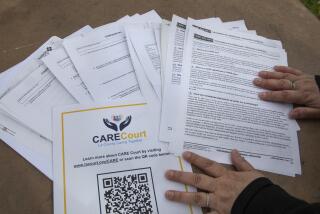O.C. clears way for court-ordered treatment of mentally ill
Driven to action by the death of a schizophrenic homeless man, Orange County on Tuesday became the first large county in California to implement a law clearing the way for court-ordered treatment for the severely mentally ill.
Laura’s Law was passed by California in 2002 but has languished for years, fully implemented only in tiny Nevada County, where the law’s namesake was shot and killed by a mentally ill man.
On Tuesday, those whose lives have been touched by mental illness arrived at the county civic center in Santa Ana to share stories of their struggles.
Michael Sitton of San Juan Capistrano showed county supervisors two photos of his 32-year-old daughter, who he said has battled schizophrenia for years. One, he said, showed her while on treatment, vibrant and loving. The second was a mug shot showing a haggard young woman, her eyes tired and her cropped hair a mess — she had been off her medication.
“I was here in 2002 ... I was here six years ago with my wife again,” he said. “If something else happens in this county ... that is on your head.”
After the death in 2011 of Kelly Thomas, who was a familiar face on the streets in downtown Fullerton, families of mentally ill adults have pushed Orange County supervisors to implement Laura’s Law. On Tuesday, after hearing from more than a dozen speakers, the board unanimously voted to implement the law.
“It’s been a long journey,” said Supervisor John Moorlach, a longtime supporter.
Most who spoke urged the board to pass the item, and dozens of supporters wore lime green stickers reading “Thank You for Laura’s Law.” But several also cautioned that court-ordered treatment could infringe on basic human rights. In the absence of Laura’s Law, mentally ill individuals can be confined against their will for 72 hours and possibly longer, but only if they pose an imminent danger to themselves or others or are gravely disabled.
Richard Krzyzanowski of the California Assn. of Mental Health Peer Run Organizations, said the law struck him as “an expensive government intervention into the private lives of its citizens.”
“As a civil libertarian, my red flags start to go up,” he added.
Others, like Audrey Woolfolk, a longtime Orange County resident, said the law provided some hope for their loved ones.
After the vote, Woolfolk dabbed her eyes and said she hoped her 24-year-old daughter would be among the first helped by the program.
“Once free of the hospitals, due to cognitive difficulties, she has proved over and over (10 times) that she is not capable of staying on medications and remaining in voluntary programs,” Woolfolk wrote in an email before the meeting.
Laura’s Law does not allow forced medication but does allow for coordination of and access to medication as part of a treatment plan.
The county will now allocate about $4.4 million per year in Mental Health Services Act funds to provide assessment and treatment for an estimated 120 people. The board will also need to allocate additional funds to hire up to four staff members in the public defender’s office and one in the county counsel’s office to manage legal issues associated with the program.
Supervisor Todd Spitzer said he strongly supported the measure as long as the county’s healthcare agency carefully tracks program outcomes. Other supervisors echoed that caution.
Mary Hale, county director of Behavioral Health Services, emphasized that the county has a number of metrics that healthcare staff will tally from the start. Counties are also required by Laura’s Law to report program data to the state.
To qualify, a person must suffer from mental illness, be unlikely to survive safely in the community without supervision and have a history of lack of compliance with treatment, among other qualifications. They must also have a recent history of violence and have been jailed or hospitalized because of mental illness.
Hale said she hoped the program would be fully up and running by October.
Supervisor Pat Bates, who said she voted for Laura’s Law as a state legislator, said she would be glad to implement a program that can help “intercept that downward spiral” that, for many, becomes inescapable.
“This is an opportunity,” she said. “I don’t want to miss it.”
Ron Thomas, the father of Kelly Thomas, reflected after the vote.
He said that although Laura’s Law might not have saved his son, who died after a beating by police, he hopes the program will help the other “Kelly Thomases out there.”
Thomas gestured toward the civic center, where many of the area’s homeless spend their days.
“Hands raised, looking into the sky,” he said, “they need help.”
More to Read
Start your day right
Sign up for Essential California for news, features and recommendations from the L.A. Times and beyond in your inbox six days a week.
You may occasionally receive promotional content from the Los Angeles Times.







